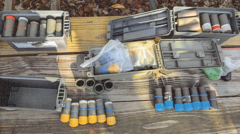The raid on a Virginia farm not only highlights the growing concerns over domestic terrorism but also raises legal and public safety questions surrounding the accused individual.
**FBI Discovers Historic Cache of Explosives at Virginia Farm**

**FBI Discovers Historic Cache of Explosives at Virginia Farm**
Amid alarming revelations, the FBI uncovers over 150 bombs linked to a suspected far-right extremist.
In a significant operation, the FBI revealed the discovery of more than 150 bombs on a farm in Isle of Wight County, Virginia, marking what is believed to be the largest cache of explosive devices ever seized by the agency. The arrest of 41-year-old Brad Spafford on December 17 occurred after authorities received a tip-off about his stockpiling of weapons and homemade ammunition on a property where he resides with his wife and two young children.
During the investigation, agents were alarmed to find some devices stored in an unsecured backpack marked with the phrase "#nolivesmatter," a reference linked to an extremist anti-government movement. Despite the alarming findings, Spafford's attorney insisted that the charges leveled against him, which currently include possession of an unregistered short-barreled rifle, do not present a threat to the community and argued for his pre-trial release.
According to the FBI's preliminary assessment, the volume of bombs found is unprecedented in the agency's history. Allegations against Spafford paint a concerning picture; he reportedly used images of President Joe Biden for target practice and expressed violent rhetoric regarding Vice President Kamala Harris. Notably, he has a history of bomb-making, having lost three fingers in a prior incident in 2021 related to a homemade explosive.
Detailed court documents reveal that a neighbor, equipped with a recording device, alerted authorities to Spafford’s ongoing bomb-making activities, prompting the search of the 20-acre property. The FBI categorized most of the found devices as pipe bombs, with some described as labeled "lethal," and others shockingly stored in a vest ready for use. An additional jar containing a highly volatile explosive known as HMTD was reported to be inadequately stored near food items within reach of children.
Despite the grim findings, Spafford’s lawyer countered the narrative, branding the government’s claims as "speculation and fear mongering." They emphasize that there is no prior criminal record associated with Spafford nor evidence of threats towards anyone based on political beliefs. The case has sparked debates on the implications of domestic extremism, as well as the appropriateness of pre-trial detention measures.
Federal authorities are currently contesting a decision made by a judge to release Spafford under electronic monitoring, indicating the case has wide-reaching implications for community safety and the judicial response to such significant threats.
During the investigation, agents were alarmed to find some devices stored in an unsecured backpack marked with the phrase "#nolivesmatter," a reference linked to an extremist anti-government movement. Despite the alarming findings, Spafford's attorney insisted that the charges leveled against him, which currently include possession of an unregistered short-barreled rifle, do not present a threat to the community and argued for his pre-trial release.
According to the FBI's preliminary assessment, the volume of bombs found is unprecedented in the agency's history. Allegations against Spafford paint a concerning picture; he reportedly used images of President Joe Biden for target practice and expressed violent rhetoric regarding Vice President Kamala Harris. Notably, he has a history of bomb-making, having lost three fingers in a prior incident in 2021 related to a homemade explosive.
Detailed court documents reveal that a neighbor, equipped with a recording device, alerted authorities to Spafford’s ongoing bomb-making activities, prompting the search of the 20-acre property. The FBI categorized most of the found devices as pipe bombs, with some described as labeled "lethal," and others shockingly stored in a vest ready for use. An additional jar containing a highly volatile explosive known as HMTD was reported to be inadequately stored near food items within reach of children.
Despite the grim findings, Spafford’s lawyer countered the narrative, branding the government’s claims as "speculation and fear mongering." They emphasize that there is no prior criminal record associated with Spafford nor evidence of threats towards anyone based on political beliefs. The case has sparked debates on the implications of domestic extremism, as well as the appropriateness of pre-trial detention measures.
Federal authorities are currently contesting a decision made by a judge to release Spafford under electronic monitoring, indicating the case has wide-reaching implications for community safety and the judicial response to such significant threats.






















